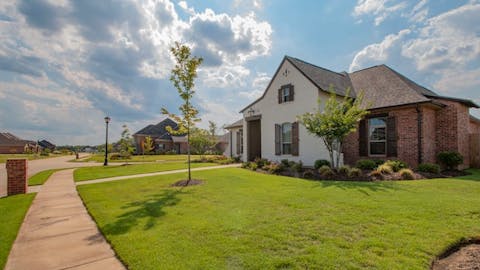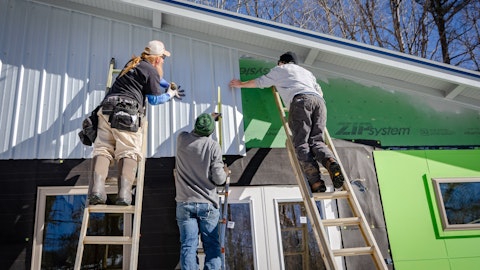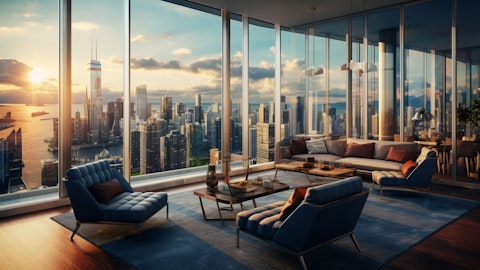Going to next page. We can see here the evolution of the rental EBITDA in dollar terms, the last 12 months were stable compared with the fiscal year ’23 at $166 million that compared with pre-pandemic levels are very, very good numbers, 26% or 27% above the 2019 numbers. On the next page, we can see the evolution of our leverage. There was an impressive deleverage of the company since 2020 going to levels of $240 million, this is a completely a levered company today with an LTV of less than 15%, a coverage ratio of 12 times and net debt to EBITDA of only 1.4 times, with a lot of properties and land bank that are not generating EBITDA. So the company is — the shape of our financial condition is best ever. Regarding our debt amortization schedule, this is optimized in the coming years.
The gross debt is $366 million. So we are planning to refinance part of the fiscal year ’24 in the coming days, issuing a new bond, trying to extend the tenor but also we have liquidity to serve our debt fully. The next page is related to our dividend distribution. Remember that we decided in October to distribute a dividend of ARS64 billion. That was a dividend yield of around 12%. There was — sorry, that was ARS67.4 billion, that since we announced the distribution in October, there was a new regulation in Argentina that delayed our process of payment to our GDS holders. Finally, we decided in the need to preserve the money, investing that money in money market fund, I’m not sending that money to entrepreneur to protect the funds of our investors.
Finally, we obtained a change in the regulation and the CMB, the local SEC allow us to pay. Finally, we paid in — at the beginning of the year and investors received in dollar terms, 20% more than the original payment date in Argentina. Regarding the share repurchase program, we launched the first one during the fiscal year ’23 that we finished in December. That was an investment of ARS5 billion. Then in July, we announced a new program of ARS6.5 billion. From that amount, we already invested ARS2.9 billion. So we will keep buying back shares during the rest of the year. So with that, we finish the formal presentation. Now we open the line to receive your questions.
A – Santiago Donato: Well, now is the time for the Q&A session. If you have a question, please use the chat. We will take the questions in the order we receive them. Here, we have a first question. Can you tell us more about your upcoming bond issue?
Matias Gaivironsky: Well, we have some concentration of amortizations during the coming months. So we are planning to tap the local market with a structure that we haven’t defined and we will announce probably in the coming days. But will be something similar on what we did at [indiscernible] level at the beginning of the year.
Santiago Donato: A new question. Do you expect that access to international markets will improve as the new government seek to cut the fiscal deficit and return the economy to growth?
Matias Gaivironsky: We hope so. We believe that, well, Argentina was a little disconnected to the world in the past three years. So we hope that with the normalization of the economy, the companies are in very good shape in Argentina. So the problem is the sovereign ceiling on the cost of Argentine debt. So we believe that if that starts to normalize, then there will appear opportunities for corporates. There was an example of one or YPF that tapped the international market at the beginning of the year. So that definitely will happen in Argentina normalized. In the case of IRSA, with the current status of our projects, we don’t need to tap the international market for that. I hope that the amortizations that we have are very limited with the level of CapEx that we announced, we have the liquidity and the cash generation to finance the process.
So we are not expecting. But of course, if the cost of capital starts to reduce, then we can accelerate our investment process and maybe we can tap the market in the future, but we are not planning that in the short term.
Santiago Donato: Here, we have two additional questions on the financial side. One is if the debt net — if the net debt position that we showed to take into account the dividend payment?
Matias Gaivironsky: Yes, yes. That is as of December — at the end of December, so already deducted the payment. The part that remain at the company level was taken out of our cash position in terms of our disclosure. So yes, it was net debt after the deal.
Santiago Donato: And then what influences do you see by the FX liberalization or the pesos property valuation in general and for IRSA specifically — the impact of the FX stabilization on real estate and IRSA in general?
Matias Gaivironsky: Let me say something, and, Jorge, please add whatever you want. Always, real estate in Argentina was a safe haven against the devaluation and inflation. So real estate prices were always quote in dollars. So all the properties was measured in dollars, so it’s not measured in pesos term. What you have to analyze is cost of construction that maybe if we have an inflation in dollar terms, cost of construction will be higher. That means that, that can trigger prices of real estate up, during the last two years, we saw some decline in prices because of that. The cost of construction was cheaper. So I believe that this devaluation hasn’t an impact in the short term of real estate prices, offices prices remain stable. So I don’t see an important impact on our portfolio. And I know, Jorge, if you want to add something? You are on mute.
Jorge Cruces: Yes. I believe that in the short term, it’s not going to influence very much as Argentina may recover I suppose, the whole real estate is going to recover in Buenos Aires. The salaries are going to recover. So in the meantime, it may be a little bit higher, the cost of development but then the people are going to have better salaries to acquire real estate. So it should be a steady process of real estate going up in maybe a little bit in the near future, not in the short future.
Santiago Donato: Next question, can you give us more color on Del Plata building project?
Jorge Cruces: Well, yes, it’s a pleasure for you asking about that project. The project, as I said before, it’s a whole city block, only a block away from the Obelisk. And well, here you can see the pictures right on Nueve de Julio. Nueve de Julio, I mean, in that part of the city is like talking about Times Square is like in New York, you’re close to everything, to the theaters, you’re close to subways, buses, you have great, great infrastructure. It’s very nice to be there. And as I said before, it’s a whole city block. So it has a very big impact in the city. Behind that picture that we see right there, there’s a pedestrian street. So hopefully, we’re planning to develop the whole ground floor with restaurants and something very nice.
So it’s going to be a place where a lot of tourism that’s going to go there behind that building to have a cup of coffee or have a beer. It’s going to be a building mostly for youngsters. There’s a lot of studios. We’re talking about people not only youngsters studying in universities in the city right near to that property, but also for a lot of tourism, tourism not only from the country, like people from Cordoba, from Rosario, from Mendoza, it is very comfortable to be there and to work here, maybe people who come a couple of days a week. But also this — we estimate there’s going to be a lot of foreigners using the building. We don’t know if foreigners are going to be investing in buying apartments but even though if an Argentinian is buying an apartment, there’s going to be a lot of foreigners using these apartments, maybe like Airbnb or just like monthly rents.
There’s a great pool on the roof top. There’s — you can do running, there’s a gym in the basement, you have another pool that’s all here around, you have co-working, you have living rooms, you have a place to watch cinema or to watch TV with other people, with other — even though it’s not a co-living, there’s a lot of amenities. So mostly, we’re trying to make a project for youngsters that are mostly working all over the world. And Buenos Aires is a great city, people love Buenos Aires, to stay for a couple of weeks or a couple of months a year. And we believe this is going to be a very great project for youngsters who are willing to be in Buenos Aires for short terms during the year. Mostly, there’s going to be a lot of people around Argentina who’s going to be buying these apartments.
As I said before, it’s very comfortable to be there because of all the subways and a lot of people of the rest of the country need to work in Buenos Aires, so we are really very happy with the project. Aisenson are the architects. They’re quite well known in Argentina with these kind of big projects, and we’re still going to be hiring the construction company. And well, this is going to be — we’re going to start building this building maybe in four or five months from now. I’m very enthusiastic with this project. I don’t know if I sound enthusiastic. But if there’s any more questions, I’m willing to add any more information regarding this trust, Del Plata building.
Santiago Donato: Thank you, Jorge. If there are any additional questions, we give some minutes more. During the presentation here, there’s someone that asked if we can request a presentation by e-mail, it’s going to be uploaded in the website. It’s already there. So you can see it or you can contact the IR team directly. So if there are no more questions, we conclude the Q&A session and the presentation. Thank you for joining. I will turn back to Matias for his closing remarks.
Matias Gaivironsky: Thank you very much, Santi. Thank you, everybody, to participating in the call. I believe we have during the first semester excellent numbers, excellent performance. We believe that probably during the second half will be more challenging because of the new measures of the administration trying to normalize the economy, there will be a slowdown in consumption. There was an acceleration of inflation trying to accumulate relative prices in the economy. So there was an increase in inflation and will have an impact in real wages. So consumption probably will suffer during the next months, and we will see that in our malls. I don’t know in dollar terms, that will depend on what happened between inflation and devaluation.





